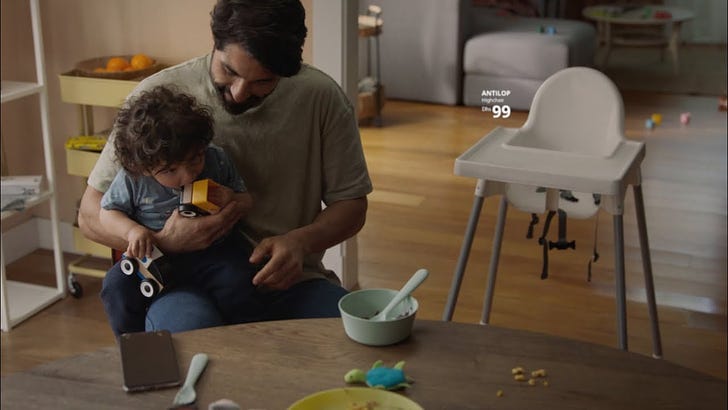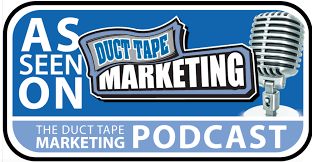🍱 IKEA is giving us the warm and fuzzies; Canned water for men; Reframing sales as a conversation
Strategically dumb and perpetually curious
Hello and welcome back to The Marketing Kable, where I'm taking you along on my journey to discover ideas, voices and campaigns that can inspire us.
something to watch
you're simply the (second) best. One of my favourite topics to rant about is the incompetence of most parents (I don't have data to back this up; my source is: take my word for it). Whenever I see kids glued to the phone screen or throwing loud tantrums over bratty issues, I curse the parents under my breath. Why did they become parents if they can’t commit to the job?
While I will keep asking this question till the end of time, I recently came across an IKEA ad that honours parents who excel at the job. Created by agencies DAVID Madrid and INGO Hamburg, the campaign features a range of simple but elegantly shot videos of parents taking care of their children - hands-on and all love. An IKEA product from their line of furniture for children is featured in each video, but it is not being used.
"Proudly second best" appears the campaign title on the screen as the image blurs, leaving the viewer feeling all warm and fuzzy inside.
Here's why I loved the campaign:
The Simplicity: There's no dialogue, no fancy schmancy camera work or special effects, and no multi-instrumental background score. Just universally recognised and cherished moments and one line of unforgettable copy.
The zoom: Each video begins with a close-up shot of an item of IKEA furniture and then zooms out to show a parent caring for their child right next to it.
A baby sleeps on her mother's chest while the cot lies empty; a child stands on her mother's knees to reach the basin even though the stool is right there; a father feeds his son on his lap alongside the vacant high chair.
Even though they're merely pointing out the obvious - they can never be as valuable as a parent's role in childcare - IKEA endears itself to the viewer. In a different context, this decision to show products just standing there, not in use, might seem counterproductive - the zoom-in at the start ensures the product is the first thing the viewer sees before this sweet tableau unfolds.
something to read
Better than all the rest. TIL that there is such a thing as "canned water".
Pushing aside my zillion reservations about commodifying something like water in a world that is already facing a major water crisis, there are some major lessons to be learned from Liquid Death (yes, that's what it's called), an American (obviously) brand launched in 2019 that has now become a cult favourite among "young men who previously might only have drunk water at the gym". (In other news: Men are still menning..)
In this article in Smart Company, Dan Monheit gives us a detailed account of all the ways in which the brand broke the rules to deliver what he calls a "marketing masterstroke". I'll leave you to go through the whole thing, but here's the one that popped out for me:
Instead of competing with other packaged water brands with their homogenous pristine mountain spring-fit athlete promo campaigns, Liquid Death chose a different section of the market entirely: men who drink energy drinks and draught beers. A large section of these men also happen to be interested in a heavy metal and punk rock aesthetic - and voila - there you have it - Liquid Death's sweet spot of a customer base.
It's such a genius move - to draw from the language, aesthetic and references of a subculture that typically wouldn't be associated with your category and then use them to market your brand and really own the segment. I'm going to go look for other brands that have done this. Let me know if you think of any.
something to listen to
Hang on every word you say. Last week, I workcationed with my colleagues from Bee. We stayed at a hostel in Sissu, a village in Himachal Pradesh - surrounded by snow-capped Himalayan ranges. It was ethereal. The only problem with Sissu? The food wasn't so good. Every afternoon and evening, we'd step out of our hostel to find a place that served at least 30 per cent of the items on the menu (this was rare).
One evening, we came across a place called 'La Hault'. It looked swanky, and I loved the name. Sissu is in the Lahaul district, so I thought it was a great pun (not all my colleagues shared my views). And the food was decent too.
Why am I telling you all this? It's because intriguing names give me a kick. So when I found a podcast called Duct Tape Marketing Podcast, I had to tune in. And much like La Hault, I liked the fare it offered.
I'm recommending one particular episode featuring John Jantsch and his guest, David Newman, which inadvertently addressed some of my own challenges with the marketing process.
First off, David talks about how many people despise the word "selling." He believes it's because of the negative experiences we've had as both buyers and sellers. We've been exposed to manipulative and pushy sales tactics, which have given sales a bad reputation. But David suggests reframing Sales as an invitation and a conversation instead.
Think of it as having a friendly chat with someone, understanding their needs, and seeing if you can help them. By shifting our mindset and approach, selling becomes much more natural and enjoyable.
Another important point David made was that anyone could excel at selling. It's not about having a particular personality trait or being a born salesperson. The key skills to cultivate are being strategically dumb and perpetually curious, something we do brilliantly at Bee, if I may say so myself. Being strategically dumb means approaching every client as if they're your first, asking questions and digging deeper to truly understand their situation. And being perpetually curious means never settling for the first answer but asking follow-up questions to uncover the underlying problems or needs.
Listen to the full conversation here.
Epilogue
I've realised that whenever I reflect on why I loved a certain campaign or bit of copy, I am reminded of the famous opening line of Tolstoy's Anna Karenina: "All happy families are alike; each unhappy family is unhappy in its own way". All the marketing content I love seems to share a common thread, and the ones that put me off are, well, a diverse bunch.




